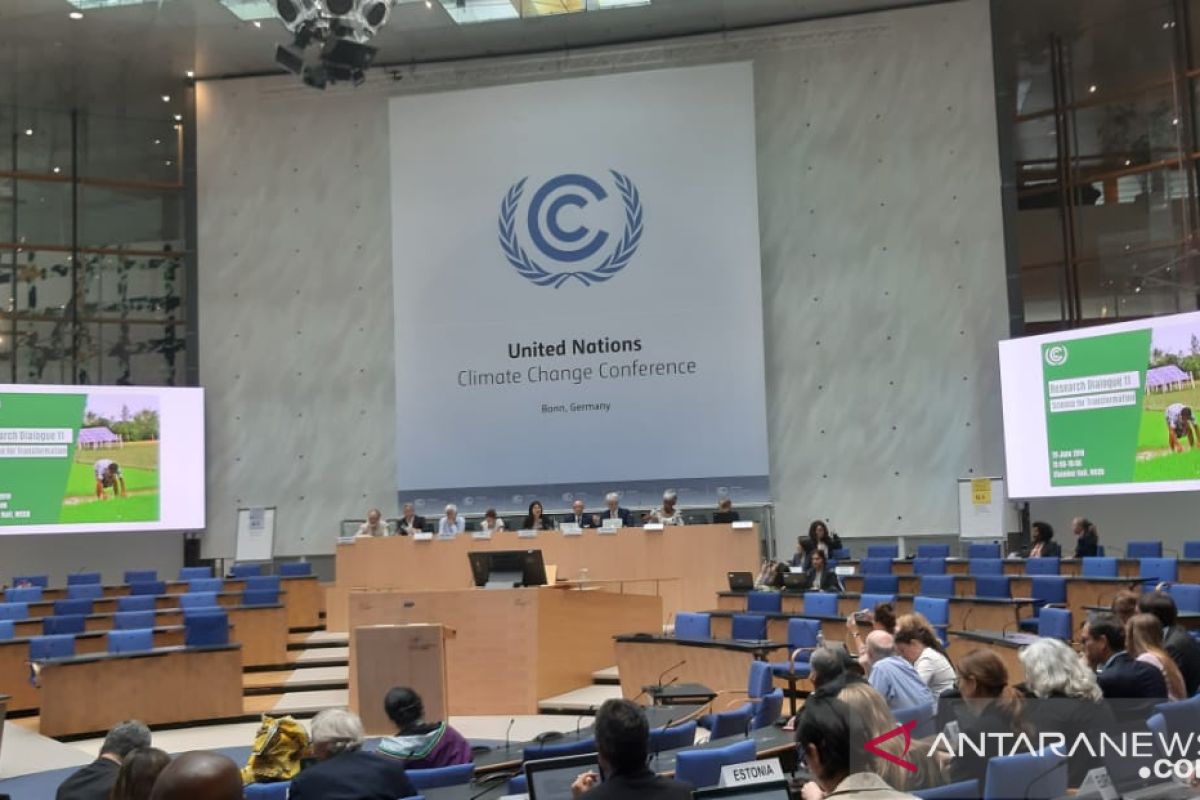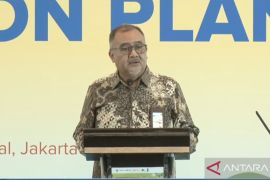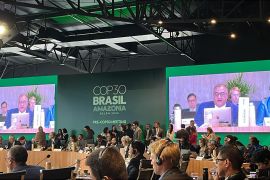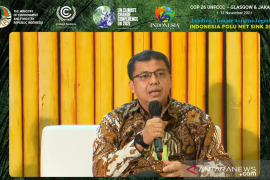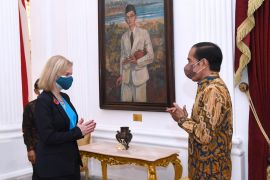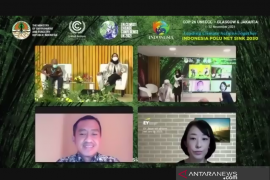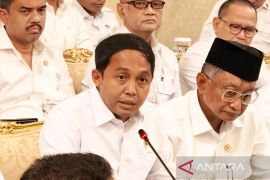Why do we talk about forest and land fires that took place here, when in fact, they have been decreasingJakarta (ANTARA) - In the framework of global cooperation in the forestry sector, drawn up based on conditions at least 10 or 15 years back, most challenges appeared to be faced in developing countries, though it is no longer the case recently.
Indonesian Vice Minister of Foreign Affairs Mahendra Siregar drew reference to this at the session of Conference on the United Nations Framework Convention on Climate Change (UNFCCC) held on Monday (Nov 2).
"All these times it was as though developed countries have better knowledge and track records. Hence, the direction of cooperation seems like developed countries must help developing countries," Siregar explained.
However, he stressed that conditions have changed in recent years, particularly in terms of the ability of countries to tackle land and forest fires.
The Indonesian vice minister averred that in recent years, developed countries had borne witness to forest and land fires on a larger scale than developing nations.
Developed countries, such as the United States, Australia, and some of the European nations, had contributed to a rise in greenhouse gas emissions resulting from forest and land fires in the last few years.
Siregar pointed out that some 1,626 forest and land fires were recorded in Europe and some 74,100 forest and land fires arose in the Latin American region during 2020.
Moreover, the vice minister noted that in 2020, five million acres of forests in Australia were ravaged by fires and 3.5 million acres of forests in the United States were scorched during the January-August period.
Siregar further pointed out that the area of forest and land burnt in fires in Australia was 33 times the area of burnt forest and land in Indonesia.
"Moreover, (the area of forest and land that was burned) in the United States could be more than 20 times the area of (burnt forest and land) in Indonesia. This is a fact. Hence, we can no longer direct our future cooperation based on data from 10 or 15 years ago," Siregar emphasized.
Meanwhile, forest and land fires in Indonesia have, in fact, decreased drastically in 2020.
Although falling short of being completely good, Indonesia's forest management policies have yielded better results.
"We have succeeded in implementing forest management policies that are much more effective and better than some countries I mentioned earlier," he pointed out.
In 2015, extreme weather conditions exacerbated forest and land fires in Indonesia and resulted in over two million hectares of forest and land being burnt down. However, the area of burnt land and forest has significantly decreased to below 150 thousand acres by 2020.
"We are not aware that we should be happy with such an improvement (in our forestry management). Most of the developed countries also do not realize this and are still under the belief that they are the ones, who still have to offer assistance," Siregar remarked.
"Hence, the truth is Deputy Minister of Environment and Forestry Alue Dohong partook in the UN Climate Change Conference to share our best practices and experiences in dealing with forest and land fires," he added.
Such improvement in forestry management, however, must not necessarily make the Indonesian government complacent and go off-guard in further undertaking efforts to prevent and control forest and land fires.
Indonesia must continue to bolster its efforts and cooperate with other nations in preventing land and forest fires as well as combating the rise in greenhouse gas emissions that can lead to global warming.
"The Earth's climate has changed. Why do we talk about forest and land fires that took place here, when in fact, they have been decreasing. Meanwhile, it has increased by 20 to nearly 30 times somewhere else (in developed countries). Hence, we have succeeded in reducing emissions here, how about there?" Siregar pointed out.
As a country whose efforts have yielded good results, the vice minister highlighted that Indonesia was obligated to help other countries to make improvements through the climate cooperation scheme.
Hence, Siregar emphasized that since the conditions had changed, evaluation and recalibration had to be conducted in international cooperation on forest management and climate change control.
Cooperation in forest management and climate change control must be conducted with the right scheme based on the recent existing conditions.
"The most important area of focus for Indonesia is what we need to achieve for our national interests and for our future generations. Hence, please do not distort facts by saying if there is no money, we do not want serious cooperation. I do not think so. That is not the problem," he stated.
Strong negotiations
Deputy Minister of Environment and Forestry Alue Dohong stated that the political dynamics related to climate change issues at the global level require some strong negotiation from Indonesian negotiators partaking in the discussion on UN climate change cooperation scheme.
Dohong believes that negotiators should increasingly focus on the direction of development of issues pertaining to climate change.
Citing an example, the minister remarked that some issues discussed at the global level had led to efforts to make tropical forests a global public belonging.
"My question is, why only tropical forests? There is a political element in it. As we know about public goods, there are only two conditions. First, everyone can use and own them, and second, there is no competition in consuming them," he expounded.
Dohong also pointed out the tendency to shift the burden of reducing greenhouse gas emissions mainly to developing countries with tropical forests after the Paris Agreement.
"This kind of shift necessitates our caution," he stated.
Furthermore, he pointed to some encouragement from several parties to turn Indonesia's forest areas into ancient forests, with threatened sustainability, so that later the forests might no longer be used for utilization activities.
In addition, Dohong noted that at the global level, a tendency existed to mainstream deforestation-free value changes that could later create some difficulties to trade forest products, both timber and non-timber, as well as plantations since the products must be ensured to be deforestation-free.
"It is a recent matter that is being rolled out. It is very dangerous. I think zero deforestation is a dream; it's impossible. It is because development continues, humans continue to grow. It means we really need space to be regulated. However, it does not mean we expect deforestation to continue," he stated.
"Those three things have been my concern. If it continues to be rolled out and then adopted in an international convention and becomes legally binding, then we are 'dead'," Dohong emphasized.
"What I mean with 'dead' is when we are forced to legitimize our tropical forests to be dedicated as global public goods, so the opportunity to use the forest is lost," he further explained.
Dohong also emphasized that the most important aspect was to control in a way that the function of the forest ecosystem is maintained.
In an effort to address the issues of making the world’s tropical forests as global public goods, the Indonesian government -- through the Ministry of Environment and Forestry along with the Ministry of Foreign Affairs -- had striven to strengthen the capacity of Indonesian negotiators, who fight for national interests in the negotiation on the global scheme for addressing climate change.
In the early stages, 30 young civil servants from the two ministries were trained to reliably conduct negotiations in keeping with Indonesia's interests in the negotiation for the United Nations Framework Convention on Climate Change and other global conventions.
Dohong further emphasized that all Indonesian negotiators to be involved in negotiations at the 26th United Nations Climate Change Conference (COP26) -- held in Glasgow, United Kingdom in November 2021 -- must be able to carry out what is known as the best alternative to a negotiated agreement (BATNA).
In conducting negotiations at international forums, he expected all Indonesian negotiators to utilize strong facts and data to secure the most favorable position for the nation’s interests.
Thus, as the owner of vastly rich tropical forests, largest mangrove forests, and largest tropical peat swamp forests, Indonesia must not solely be a follower.
To this end, Indonesia must become a driving force and decision maker in global negotiations for the sake of our national forests and interest.
Related news: Indonesia's commitment to handling climate change undeterred: Minister
Related news: Countries should adopt just climate change handling measures: Ministry
Editor: Gusti Nur Cahya Aryani
Copyright © ANTARA 2020
